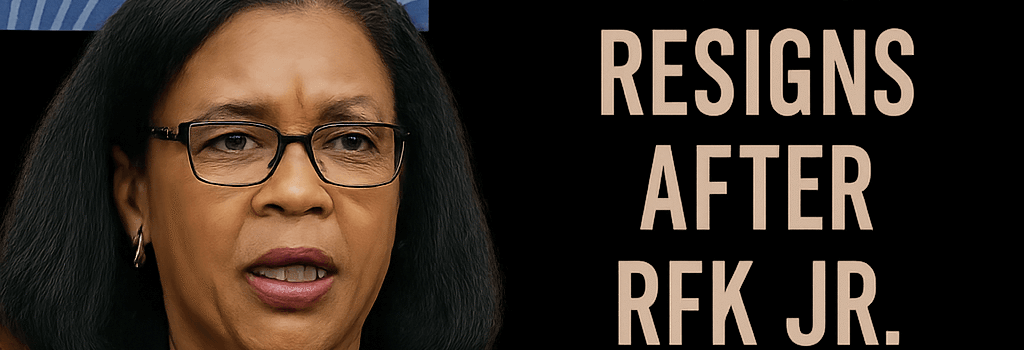CDC Vaccine Expert Resigns After RFK Jr. Access Restriction

In early June 2025, Dr. Lakshmi Panagiotakopoulos, a pediatric infectious disease specialist and co-leader of the CDC’s COVID-19 vaccine working group, abruptly resigned. Her departure follows Health Secretary Robert F. Kennedy Jr.’s unilateral changes to vaccine recommendations, which have reignited debate over federal public health authority, vaccine efficacy, and policy implementation.
Background: Unprecedented Policy Shift
On May 28, 2025, Kennedy issued an order to revocate and alter existing CDC vaccine guidelines that had recommended mRNA COVID-19 vaccines for all individuals aged 6 months and older, with explicit emphasis on pregnant people. The changes included:
- Pregnancy Advisory: Guidance updated to “delay vaccination until after pregnancy if vaccine is indicated.”
- Shared Clinical Decision-Making: Healthy children’s vaccination reclassified under a “shared decision-making” model between providers and guardians.
These actions bypassed the CDC’s Advisory Committee on Immunization Practices (ACIP) and disrupted a decades-old consensus-driven process scheduled for June 25–27, 2025.
Dr. Panagiotakopoulos’ Resignation: Professional and Ethical Stand
In her resignation email to ACIP colleagues, Panagiotakopoulos wrote:
“My career in public health and vaccinology started with a deep-seated desire to help the most vulnerable members of our population, and that is not something I am able to continue doing in this role.”
Her departure highlights internal tensions within the CDC and raises questions about the future of federal vaccine guidance:
- Expert Integrity: The reliance on peer-reviewed trials and safety monitoring may be undermined.
- Public Trust: Abrupt policy shifts risk fueling vaccine hesitancy.
- Operational Delays: ACIP’s June meeting will now play catch-up, impacting the start of the fall vaccination campaign.
Technical Overview: Vaccine Platforms and Efficacy Data
The CDC and ACIP based their original guidance on robust data from mRNA platforms (BNT162b2 by Pfizer-BioNTech and mRNA-1273 by Moderna). Key technical findings include:
- Neutralizing Antibody Titers: Post-booster geometric mean titers (GMTs) against Omicron subvariants (BA.5, BQ.1.1) increased 8–15×.
- Vaccine Effectiveness (VE): Real-world VE studies show 70–85% protection against hospitalization in pregnant people and 60–75% against symptomatic infection in children aged 5–11.
- Safety Profile: VAERS and VSD surveillance report myocarditis rates at 1–2 per 100,000 in adolescents, with >95% full recovery.
These metrics underpinned the CDC’s unified recommendation across age and risk groups.
Regulatory and Policy Implications
Health law experts warn that uncoordinated executive orders can set precedents affecting other immunization programs:
- Preemption Risks: Federal preemption of state immunization laws could create a patchwork of regulations.
- Insurance Coverage: It remains unclear whether vaccines administered under “shared decision-making” will qualify for no-cost coverage under the Affordable Care Act.
- Legal Challenges: A coalition of state attorneys general and public health associations is reportedly preparing litigation to restore the ACIP process.
Impact on Public Health Infrastructure
Stakeholders warn of cascading effects on vaccination logistics and resource allocation:
- Supply Chain: Manufacturers had pre-positioned millions of doses based on ACIP timelines; redistribution may be required.
- Provider Training: Clinics and pharmacies geared up for standardized protocols now face retraining staff in shared decision workflows.
- Data Monitoring: CDC’s Vaccine Safety Datalink (VSD) must recalibrate enrollment criteria to track off-protocol administrations.
Expert Opinions and Forward Outlook
Leading epidemiologists and vaccine scientists have publicly criticized the move:
“Disrupting the ACIP consensus undermines the transparency and reproducibility that underpin evidence-based immunization policy,” says Dr. Jennifer Liang, professor of epidemiology.
“We risk creating confusion that could decrease uptake by 15–20% in key populations,” adds Dr. Anil Gupta, vaccine safety expert at Johns Hopkins.
Looking ahead, ACIP’s late June meeting will need to reconcile the executive order with existing data, while the CDC leadership considers potential reinstatement of the original guidelines.
Conclusion
Dr. Panagiotakopoulos’ resignation underscores the high stakes at the intersection of science and policy. As the U.S. navigates emerging SARS-CoV-2 variants and prepares for the fall vaccination season, clarity and adherence to established processes remain critical to protect vulnerable populations.